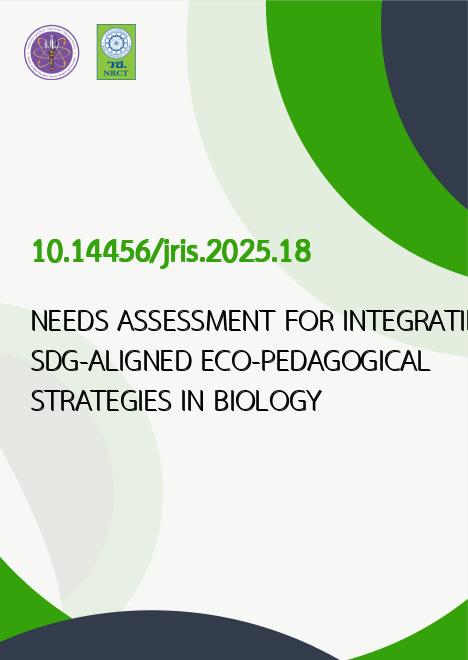
|
NEEDS ASSESSMENT FOR INTEGRATING SDG-ALIGNED ECO-PEDAGOGICAL STRATEGIES IN BIOLOGY |
|---|---|
| รหัสดีโอไอ | |
| Creator | Maria Theresa G. Tadena |
| Title | NEEDS ASSESSMENT FOR INTEGRATING SDG-ALIGNED ECO-PEDAGOGICAL STRATEGIES IN BIOLOGY |
| Contributor | Monera A. Salic-Hairulla |
| Publisher | ห้างหุ้นส่วนจำกัด นวัตกรรมการเรียนรู้สร้างสรรค์ |
| Publication Year | 2568 |
| Journal Title | Journal of Research and Innovation for Sustainability (JRIS) |
| Journal Vol. | 2 |
| Journal No. | 3 |
| Page no. | 63–85 |
| Keyword | eco-pedagogy, eco-pedagogical strategies, needs assessment, Sustainable Development Goals (SDGs), SDG integration |
| URL Website | https://so17.tci-thaijo.org/index.php/JRIS |
| Website title | Journal of Research and Innovation for Sustainability |
| ISSN | 3056-9397 |
| Abstract | This study aimed to assess the integration needs of junior high school biology teachers in adopting Sustainable Development Goal (SDG)-aligned eco-pedagogical strategies. Specifically, it evaluated teachers’ familiarity with SDG 13 (Climate Action), SDG 14 (Life Below Water), and SDG 15 (Life on Land); identified challenges hindering their ability to implement these strategies; and explored their perceived needs for professional development and resources. Using a descriptive survey research design, the study developed, validated, and implemented a needs assessment questionnaire. Quantitative data were collected through Likert-scale questions, while open-ended responses provided qualitative insights. Findings revealed that while most teachers were moderately familiar with sustainability topics they could not clearly connect these to specific SDGs. The most common challenges identified were insufficient training, limited access to teaching resources, and difficulty fitting sustainability topics into an already full curriculum. Teachers expressed that they struggled to design relevant lessons due to these constraints, especially when lacking multimedia materials or context-based examples. The study highlights the importance of targeted interventions, such as resource development and capacity-building programs, to bridge the gap between existing practices and sustainability-focused education. Recommendations include designing training modules, aligning curricula with SDG principles, and fostering institutional support to enable teachers to implement SDG-aligned strategies effectively. |